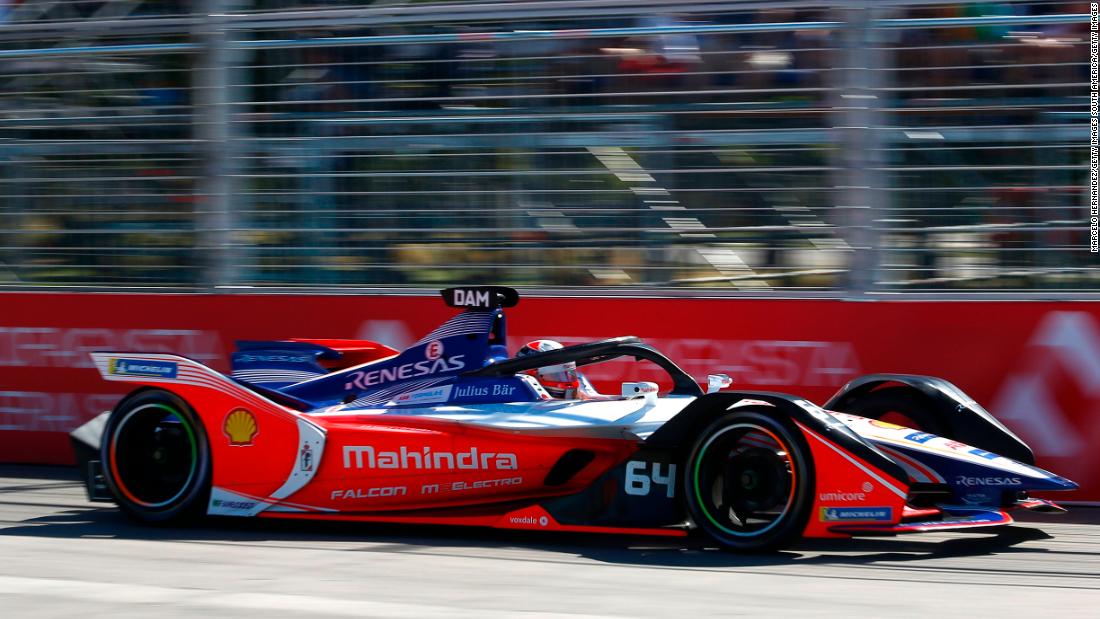
While still in its infancy, there is that hope that Mahindra Racing can have a similar impact in the future.
One of the teams on the grid from Formula E's inception, it leads both the drivers' and teams' championships although the outfit's CEO Dilbagh Gill is keen to play down talk of title glory.
"I don't think we're championship contenders just yet," he told CNN.
The current championship leader Jerome D'Ambrosio is under no illusions that he is merely a small cog in a big wheel.
The team is owned by Mahindra & Mahindra, the only mainstream electric carmaker in India, which has been buoyed by the Indian government's pledge to clean up one of the world's most polluted countries with an ambitious plan to sell only electric cars by 2030.
India accounts for seven of the world's 10 cities with the worst air pollution, according to a recent report and Gurugram, a suburb of the Indian capital New Delhi, is the world's most polluted city, according to Greenpeace and AirVisual.
D'Ambrosio, who won the second race on the calendar in Morocco, said: "We're like a big company with the soul of a small team, and that can be the key to the success of this team.
"It's true we're part of a bigger picture and group of businesses, and we each have our individual roles to play. Mine is to drive the car and, as a racing driver, you have to go for the win. Anything less is not enough but we need to strive for that win even if we're fighting against some big names and some big teams."
Mahindra's supercar
Mahindra has been selling cars since the late 1940s but produced its first electric model in 2013 after acquiring the pioneering electric car maker Reva. Mahindra plans to raise its production of electric cars by 5,000 a year to 60,000 by 2020.
But as Gill explains, the wider brand is looking beyond just typical road cars for his electric revolution.
At the current Geneva Motorshow, it unveiled its electric supercar Battista, and it is looking towards other vehicles too.
Gill explained: "Electric vehicles are still in their infancy, and India is a large market, one of the largest in the world. We realize the efficiency of electric vehicles and commercial vehicles.
"Okay, it may not be sexy but we're looking at the whole electric vehicle industry be that trucks coming in and out of cities causing pollution problems to buses and tuktuks."
In addition, it has branched out into electric bikes and scooters with the purchase of American company GenZe, and already, Mahindra has pledged that 25% of its entire vehicle fleet will be electric by 2020.
But the company believes Formula E can help spread the message of green power. The series is gaining global popularity, with a race mooted for India in the future, and there is the suggestion that it could one day outstrip Formula 1 due to its relevance to the changing motoring industry.
Gill admits that Formula E acts as a "marketing platform bringing the brand into new markets" but also in how transferable the technology the likes of D'Ambrosio's car is to a road car.
'Much more than Formula 1'
Gill estimates transferring technology from an F1 car to a road car takes an estimated five years. For Formula E the technology transfer is about 18 months.
The steps the team have made are huge -- a 1% improvement in efficiency in their third season on track through software improvements alone, impressive bearing in mind the efficiency rate was already 93%.
"The tech from a racing car, you're seeing that on a road car," he explained. "We're delivering that so much more to a road car than F1."
There is a regular interchange of ideas between the racing team, notably technical director Lewis Butler, and the wider Mahindra brand in India. The different sides of the Mahindra business travel back and forth from India to the racing team's UK headquarters to share intelligence.
D'Ambrosio is in his first year with Mahindra Racing but his fifth season in all in the series since its inception.
Of the manner in which it has taken off, he said: "Formula E has gone from nothing to this in five years. I'm surprised. If you'd told me you're be right here now, I would have argued.
"For motorsport, you need to be relevant, to be accepted, to make sense in 30, 40 or 50 years' time. And we are with what's happening with the industry and electric vehicles. We're developing electric vehicles and maybe in even 20 years' time all vehicles will be electric. With that in mind, what would be the point spending money on racing cars?
"I love the technology and the transfer to road cars -- it's quite amazing. Being part of that technical transfer and being on the edge of it is quite exciting. Everything we do is to adapt and evolve for tomorrow.
"For me Formula E is the future. I love it. I wouldn't want to be anywhere else. I love the message and the concept. That's where the future belongs."
Bagikan Berita Ini














0 Response to "Mahindra hopes to spark electric car revolution with on-track success"
Post a Comment